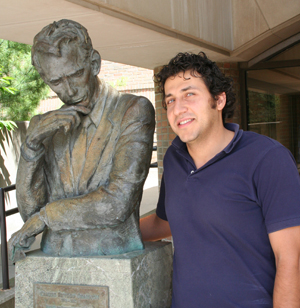Ali Nazari receives Best Paper Award at ISIT 2009
Nazari’s research is focused on an information theoretic approach to the problem of multi-terminal communications systems.

 Enlarge
Enlarge
Ali Nazari, graduate student in Electrical Engineering:Systems, won a Best Student Paper Award at the IEEE International Symposium on Information Theory (ISIT) held in Seoul, Korea in June28-July 3, 2009, for the paper, “New Bounds on the Maximal Error Exponent for Multiple-Access Channels,” by Ali Nazari, S. Sandeep Pradhan, and Achilleas Anastasopoulos.
Mr. Nazari describes his research as being primarily focused on an information theoretic approach to the problem of multi-terminal communications systems.
“This rapidly growing field is applicable to diverse areas such as sensor networks, video coding, mobile cellular networks, and packet switched wireline networks,” stated Nazari. “My research centers on reliability in multiuser communication systems, such as wireless networks. In information theory, the reliability of a single user system has been well studied. However, there exists a large gap between a single user and a multiuser system. This is primarily because the users cannot communicate while transmitting data. Despite our knowledge about point to point systems, little is known about multiuser systems since the previous bounds on the reliability of multiuser systems do not have a similar structure.”
“In this paper, we used a graph-based approach to obtain upper and lower bounds of a similar structure. Our approach has facilitated further research on the topic and has brought us one step closer to obtaining the exact value of the reliability function in a multiuser communications systems.”
Mr. Nazari works with Professors S. Sandeep Pradhan, and Achilleas Anastasopoulos, faculty in the Electrical and Computer Engineering division of the Department of Electrical Engineering and Computer Science.

 MENU
MENU 
